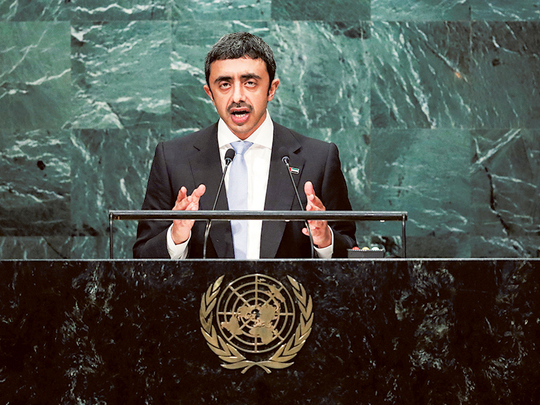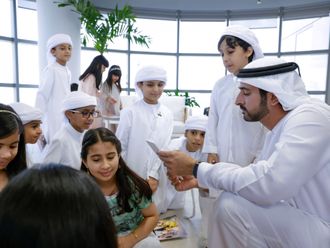
NEW YORK: The UAE has unwavering faith in the role of the United Nations and its organs, especially the UN Security Council, in maintaining international peace and security. And Shaikh Abdullah Bin Zayed Al Nahyan, UAE Minister of Foreign Affairs and International Cooperation, told the General Assembly of the UN that the UAE expects the UN to play an effective role in addressing and resolving conflicts, and strengthening states’ fortitude through a framework that ensures respect for the national sovereignty of states and non-interference in their internal affairs.
“Our region, which suffers from serious crises and conflicts, urgently needs a more effective method to confront these crises and disputes based on deep rooted solutions backed by the international community,” Shaikh Abdullah said, adding that countering terrorist groups is a right and duty of all states.
However, “resorting to blindly placed laws that ignore the effective role played by a number of states in countering terrorism after the suffering of others, such as the US Congress JASTA (Justice Against Sponsors of Terrorism Act), will lead to further arbitrary policies and destabilise the existing strong relationships between allies,” he added.
“In our region and beyond, several countries are facing multiple crises and conflicts that ignited after 2011. We have witnessed a number of Arab countries, including Yemen, Libya, Iraq, Syria and Somalia, that have descended into internal fighting. At the same time, the Palestinian people’s plight continues under the Israeli occupation without a just solution on the horizon that returns to the Palestinian people the rights, that were stripped of them, to establish their state on June 1967 borders, with (occupied) east Jerusalem as its capital,” he said. “Furthermore, regional interference in Arab affairs, mainly perpetrated by Iran, the only country in the world with a constitution that explicitly calls for exporting its revolution, has aggravated conflicts in the region. “The past few years have shown that solutions based on crisis management are ineffective. Therefore, joint international efforts must focus on finding fundamental solutions for these conflicts.
“We are all aware of the incidents of violence and terrorism, which have taken unprecedented forms and used heinous methods, causing fear and terror not only in the Middle East but in many countries of the world, and which proved that violence and terrorism are no longer associated with a certain state or a region, but are global threats, with no borders.
“The serious challenges facing our region and many other countries, require us to reflect together on ways to address these crises and reach consensual, timely and effective solutions, without undermining the existing significant efforts made in this regard. Countering terrorist groups is a right and duty of all states. However, resorting to blindly placed laws that ignore the effective role played by a number of states in countering terrorism after the suffering of others, such as the US Congress JASTA, will lead to further arbitrary policies and destabilise the existing strong relationships between allies.
“The plight and suffering of the Palestinian people is nearing its seventh decade and has contributed to the increased waves of violence and counter violence due to the subpar management of crises without seeking serious solutions by major actors and prominent powers, including those responsible for this tragedy.”
Shaikh Abdullah said that “Iran, with its expansionist regional policies, flagrant violations of the principles of sovereignty, and constant interference in the internal affairs of its neighbouring countries, has played the greatest role in causing tension and instability in the region”.
He said that despite the nuclear agreement, “hopes that the deal would change Iran’s hostile approach have been quickly thwarted. Against all optimistic expectations, Iran wasted no time in continuing its efforts to undermine the security of the region, through aggressive rhetoric, blatant interference, producing and arming militias, developing its ballistic missile programme, in addition to its alarming designation as a state sponsor of terrorism. And despite all that has been mentioned, Tehran has refused to give up its policies. Its persistent behaviour affirms our view that the key to stability in the region lies in confronting the crises and solving them, rather than settling for attempts to manage them.”
Shaikh Abdullah said no role should be given to any extremist, terrorist or evil groups no matter what, or to those who incite sectarianism and strive to tear the very fabric of our societies apart, and this stands true of the acts of Iran in the region. Regional and international sides should also refrain from playing a negative role in these crises. If the crises continue, nobody will be safe.
“There have been serious efforts to attempt to resolve some of the imminent crises in a number of countries in the region, particularly in Yemen and Libya,” he said. “In Yemen, there have been a number of initiatives, including an effective roadmap, presented by the legitimate government of Yemen in Kuwait, and at the quartet meeting held in Jeddah this past August, that could have saved the Yemeni people from their suffering. We hope that these efforts result in a political solution if the intentions of these militias are sincere and if they live up to the standards of national interest and its responsibilities.”
Shaikh Abdullah said the UAE also welcomes the Skhirat Agreement reached by the concerned parties in Libya as well as the formation of the Government of National Accord. “We hope that it will lead to further commitment to Libyan constitution-building, and solidifies cooperation between the Presidential Council and the House of Representatives, which both represent legitimacy in Libya,” he said. “We also look forward to a unified national position that protects Libya’s territorial soil and maintains the unity of its people.”
Turning his attention to Syria, Shaikh Abdullah said UAE sees no possibility of resolving the Syrian crisis through military force. “To date, this path has only intensified the suffering of the brotherly people of Syria and increased the flow of refugees to other countries. The situation is further complicated by the interference of Iran and its terrorist militias in Syria’s affairs. This has distorted the vision for Syria and derailed it from the existing path; which is based on internationally agreed terms, which constitute the only salvation from this horrific tragedy.
“Our hearts bleed when we see the brotherly people of Syria are fleeing from death to death. We are deeply saddened that the Syrian people, who are known for their dignity and ancient civilisation, are forced by the ongoing fighting in their country to fall into an unknown fate. A fate that starts with forced displacement and with no end in sight, in addition to the humiliation they experience as they are turned away from borders. The repercussions of this crisis and the impact of violence, displacement and an uncertain future will affect generations of Syrians.”
Shaikh Abdullah said UAE affirms its deep belief in the values of justice, international law, human rights, the pillars of good governance as well as the importance of providing an enhanced environment of happiness to its citizens and residents.
“This belief is paired with practical policies which are built on the conviction that true development does not only involve economic development, but also puts investment in people at the forefront based on the principles of tolerance, acceptance of the other, and equality among all, without discrimination between men and women.” he said. “The empowerment of women has become a central policy in our country because of our belief in their pioneering societal role, their active contributions to generation-building, and their success in doing so.” Shaikh Abdullah said the crises of our region should not distract us from our core national issue which is the sovereignty of the UAE over its three islands: Greater Tunb, Lesser Tunb and Abu Musa, which are occupied by Iran against the provisions of international law and the Charter of the United Nations.
“My country has called, and continues to call on our neighbour Iran, to return the occupied islands to their rightful owners either voluntarily or through peaceful means, particularly through international justice or arbitration, in order to maintain friendly relations and good neighbourliness in the Arabian Gulf region. We also affirm that my country will never give up its sovereign right over these islands, and this approach emphasises the UAE’s insistence on the principles of international law.”












